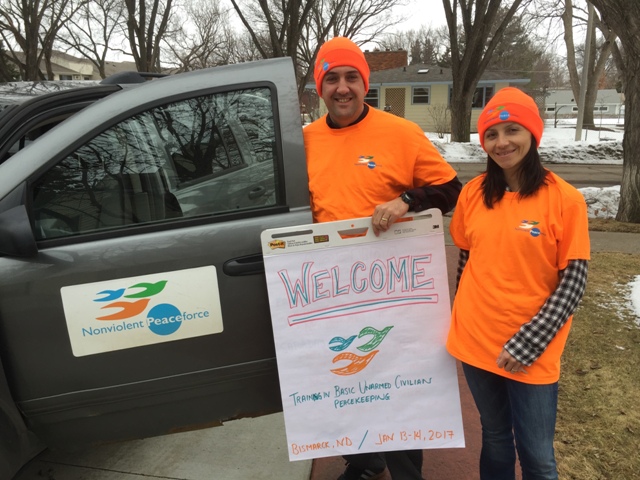Nonviolent response at Standing Rock
by Marna Anderson, Director of Development and Communications (Published March 22, 2017)
On one of the coldest weekends in January, I had the opportunity to participate in NP’s first peacekeeper training for community protectors in the U.S. The site, Bismarck, North Dakota, is approximately 50 miles away from the Oceti Sakowin camp, where tribal members and water protectors lived over the last year in an effort to stop the Dakota Access Pipeline. Approximately twenty community members attended the training looking for the opportunity to connect with one another, discuss the conflicts they faced and together find a new way forward. The group represented a wide array of members from the community including retired teachers, religious leaders, social service workers and members of the legal collective.
Those present were very engaged. What brought them together was the longing to discuss the conflict and the challenges it has created with their neighbors and friends. They wanted to learn new tools and skills to provide protection for community members who feel unsafe and to open up channels of communication between people with opposing views about the pipeline.
The power of training
Throughout the group’s time together, they participated in a few of NP’s experiential training activities that prepare civilian protectors to work in places such as South Sudan, Myanmar and the Middle East. They learned to step into others’ shoes to build empathy with people they may not agree with, to better understand the dynamics of the conflict and each party’s role in it, and to provide protection when people are under threat of violence.
Plan of action
Towards the end of the training, the group broke into smaller groups and determined three actions to take:
- Organize community members to accompany people feeling unsafe when they are in the larger towns of Mandan and Bismarck. Because of the intensified anger and racism, many report not feeling safe when going to town.
- Assist NP and other civil society organizations to conduct other trainings, so knowledge and protection skills are shared and have broader reach.
- Provide safe space for dialogue and use their own connections to break down barriers, as well as create opportunities to understand one another’s perspective.
The takeaway
To conclude Saturday’s training session, we stood in a circle and asked people to share what they were taking forward or how the training impacted them. One person said that being at the training was a “huge gift.” Another said she felt less alone and more connected to her community. Others responded with these words: Deepened relationships; new threads of connection; confirmation that peaceful change is possible; appreciation of how much working for peace stretches you; and motivation to do more.
Learning to step into another’s shoes and to discover our shared humanity is the first step to ending violence. President Obama said this so eloquently at the memorial service for the Dallas police officers who lost their lives at a protest in July, 2016:
“Can we find the character, as Americans, to open our hearts to each other? Can we see in each other a common humanity and a shared dignity, and recognize how our different experiences have shaped us? ...the Lord tells Ezekiel: I will give you a new heart, the Lord says, and put a new spirit in you. I will remove from you your heart of stone and give you a heart of flesh. That’s what we must pray for, each of us: a new heart. Not a heart of stone, but a heart open to the fears and hopes and challenges of our fellow citizens. Because with an open heart, we can learn to stand in each other’s shoes and look at the world through each other’s eyes...”
“... working for peacestretches you and motivates you to do more.”
—training participant
Update
Ten community protectors from January’s training, along with NP peacekeepers, provided protective accompaniment to water protectors evacuating the camp on February 22.
“It was inspiring to see that the working groups were proactive, organized to use strategies of unarmed civilian protection to respond to the needs of civilians. People believe in UCP and they are using it. “
— Martha Hernandez, NP Peacekeeper, Bismarck, ND

